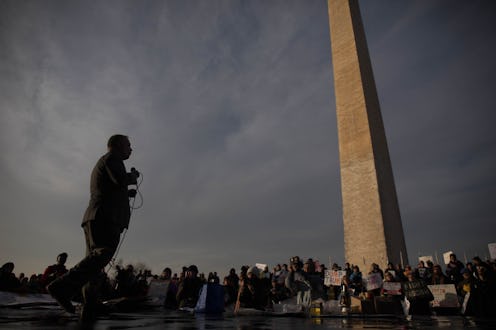News
All Your Electoral Vote Queries, Answered
Today is the day — finally, all of those red and blue states on the electoral map of the U.S. will translate into actual votes that will choose the actual president. But if you have questions about the Electoral College and the vote that's taking place today, you're definitely not alone. After all, with most presidential elections, this day comes and goes without any fanfare. The country votes, the president is elected, and then before you know it, it's already Inauguration Day.
This year, of course, is different. This year, Dec. 19 is a big news day. This year, there's all sorts of talk about faithless electors and Hamilton Electors, and suddenly people seem to know a little something about how the antiquated relic of a different era that we call the Electoral College system actually works. If you want to know more, then you're in the perfect place. After all, if something surprising actually were to happen today — which it probably won't — then you're definitely going to need to be able to speak confidently about the Hamilton Electors and who they are. Will the day go smoothly, with Donald Trump holding confidently onto his spot as president? Or will the country see a shakeup unlike it's ever seen before? Let's go a little deeper.
What Exactly Is Happening Today?
Today, the members of the Electoral College, i.e. the electors in each state, will meet to cast their votes. There are 538 electors, representing each state plus the District of Columbia, and the ones who actually get to cast their votes are those who were chosen by the party who won the popular vote in that given state. For example, California's 55 Democratic electors will go to the state Capitol to cast their votes, as will Texas' 38 Republican electors.
Does This Mean That After Today, It's All Over?
Technically not, but for all intents and purposes, it might as well be. The electors' official votes will be sent to Congress and counted on Jan. 6, but once they're in the mail, there's no changing them.
How's It Expected To Go Down Today?
The most likely outcome is that Donald Trump will receive more than 270 electoral votes, and you won't have to hear anything about the political mechanisms that kick into action in the event of no candidate garnering 270 electoral votes.
But What About All This Talk About Faithless Electors?
It's no secret that there have been numerous groups trying to convince the Republican electors to cast their votes for someone — anyone — besides Donald Trump. An elector who votes for someone besides her party's candidate is called a faithless elector. While there is no official federal law or constitutional prohibition against voting faithlessly, some states have penalties for electors who do so. So far, one Republican elector has pledged to vote for someone besides Trump, possibly for John Kasich — but in order to change the results, a total of 37 Republican electors would have to change their votes.
And What Would Happen If 37 Republican Electors Did Change Their Votes?
If Trump's vote total dipped under 270 and no one else reached that magic number, then then it would be up to the House of Representatives to vote on who would become the next president among the top three candidates receiving electoral votes.
And What About The Hamilton Electors?
Alexander Hamilton's getting a lot of play these days. Hamilton Electors have named themselves after that particular founding father, because he wanted the Electoral College to actually have a say in the democracy, and they're a group of nine Democrats and one Republican who have promised to vote for someone besides their party's candidate. The Democrats, knowing that Clinton would be unlikely to receive any support from House Republicans, say that they will vote for John Kasich as a candidate who would be the most suitable for both parties, in the vague hope that the House would choose him over Trump.
Didn't Some Guy Say That There Are A Lot Of Potential Faithless Electors?
Yep, Harvard Professor Larry Lessig claims that he's found about 20 Republican electors who are willing to vote faithlessly — but this has not been confirmed by any other sources.
Am I Allowed To Get My Hopes Up That The Results Might Change?
That's on you. It's pretty much a certainty that Clinton won't pick up any more votes, but John Kasich probably will get at least a few. Sense and logic tell me to say no, but this is the year where anything can happen. Just numerically speaking, though, it's highly unlikely that enough electors will vote faithlessly for there to be a difference. And even if there were, would Congress be willing to go against who the people voted for, even if they thought it was in the interest of the country? All of that remains to be seen.
More questions will certainly arise as the day goes on, but now at least you have some of the fundamental ones answered. At least one thing's for sure — this is a day when you'll definitely want to keep your eyes on the news.
